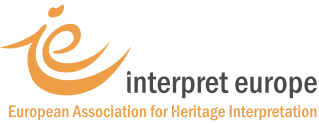Interpret Europe
 | |
| Founded | 2010 |
|---|---|
| Type | International Organization |
| Focus | Heritage Interpretation |
| Headquarters | Witzenhausen, Germany |
Area served | Europewide |
Members | 598 in 48 countries (2017) |
Directors | Thorsten Ludwig and Markus Blank |
| Website |
www |
"Interpret Europe – European Association for Heritage Interpretation" is an international membership-based association with charitable status that serves all who use first-hand experiences to give natural and cultural heritage a deeper meaning. Interpret Europe encourages dialogue and partnerships between associations and universities, providers and professionals from more than 40 countries.[1]
History
Heritage interpretation developed in US National Parks during the first half of the 20th century and was originally defined by Freeman Tilden in 1957.[2] The first national association in Europe was the Society for the Interpretation of Britain’s Heritage, founded in 1975. Interpret Europe was first developed as an open network in 2000, while the association was formally established in 2010.[3]
Structure
Interpret Europe operates on a two-tier system with an Executive Board of Directors and a Supervisory Committee. The Board of Directors manages the organisation and comprises at least two members, each authorised to act as legal representatives. The Board of Directors is appointed by a Supervisory Committee, consisting of three to nine members. The Supervisory Committee is elected by the General Assembly which must approve the activities of both the Board of Directors and the Supervisory Committee.[4]
Aims
Interpret Europe fosters research and practice on the field of heritage interpretation.[5]
Heritage interpretation is a non-formal learning approach encouraging people to search for meanings that natural or cultural heritage holds for them through first-hand experiences of heritage sites, objects or events. It is a worldwide approach mainly used in protected areas, at monuments, in museums or at zoological or botanical gardens.
Interpret Europe promotes itself as a European platform for cooperation and exchange for these institutions, as well as universities where heritage interpretation is taught.
Activities
Interpret Europe holds conferences, participates in international projects and organises training events.
Conferences typically feature up to 100 presentations, workshops and study visits, with most conference participants contributing to them. Interpret Europe conferences have been held in Germany (2011), Italy (2012), Sweden (2013), Croatia (2014) and Poland (2015). The 2016 Interpret Europe Conference, in Belgium, addressed the theme of "Heritage Interpretation – for the Future of Europe" and was dedicated to the question of how the experience of visiting historic sites contributes to learning about subjects such as human rights, active citizenship and peace.
International projects focus on a number of subject areas, including the development of European quality criteria (LEADER “Transinterpret” Project, Leonardo “TOPAS” Project), the development of training course offers (Leonardo “HeriQ” Project), working with specific audiences (Grundtvig “HISA” Project) and dealing with competence-based learning approaches (Leonardo “IOEH” Project, Grundtvig “InHerit” Project, Erasmus+ “HIMIS” Project).
Training events are offered in different languages and currently focus on certification courses for interpretive guides, hosts and writers at visitor-related facilities, such as parks or museums.
Cooperation
Interpret Europe is part of a global alliance, cooperating with the National Association for Interpretation (USA), Interpretation Canada, Interpretation Australia and other networks and initiatives. In Europe, there are currently joint projects with the Association for Heritage Interpretation (UK), with Sdružení pro interpretaci místního dědictví (Czech Republic) and with Interpretirajmo Hrvatsku (Croatia). Interpret Europe has also entered into an exchange with the Asociación para la Interpretación del Patrimonio (Spain) and with the Associação de Interpretação do Património Natural e Cultural (Portugal). Interpret Europe supports the development of further national associations in Europe.
References
- ↑ 1. European Heritage Alliance
- ↑ Freeman Tilden: Interpreting Our Heritage. 1. Auflage. University of North Carolina Press, Chapel Hill 1957
- ↑ 3. Tilkin, G. (ed.): Professional Development in Heritage Interpretation. Landcommanderij Alden Biesen, Bilzen 2016, 13
- ↑ Interpret Europe Constitution
- ↑ Freiburg Declaration